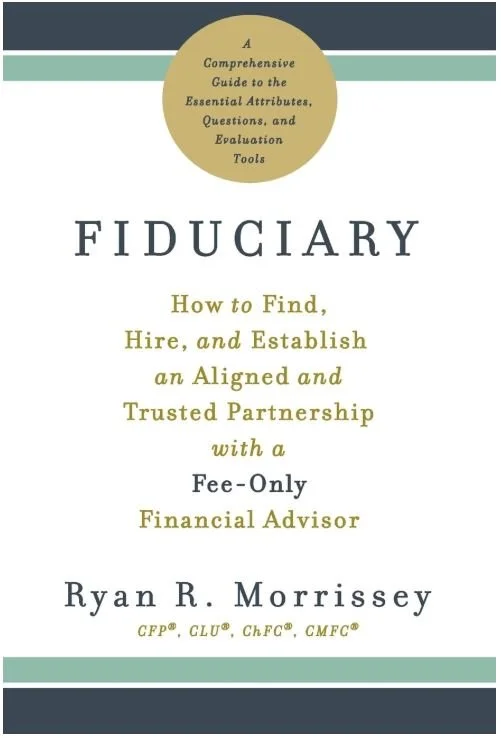What Is a Fiduciary Advisor — and Why It Matters
Welcome back! This week I’m tackling a great listener question:
“What is a fiduciary financial advisor, and does it really matter if my advisor is one?”
It’s a topic I’ve discussed before — and one that is worth revisiting as it is an important question. So much so that a few years ago, I even wrote a book on this very subject: Fiduciary: How to Find, Hire, and Establish an Aligned and Trusted Partnership with a Fee-Only Financial Advisor.
If you’re considering hiring a financial advisor — or wondering whether your current one truly acts in your best interest — understanding what it means to be a fiduciary could be one of the most important financial decisions you make.
What Does “Fiduciary” Actually Mean?
A fiduciary is someone who is legally and ethically required to act in the best interests of their client. You’ll find fiduciary obligations in several professions — attorneys, executors, corporate officers, and board members all have them.
In the world of investing, fiduciaries typically operate under registered investment advisory (RIA) firms. These firms and their advisors — known as investment advisor representatives — must always put their clients’ interests ahead of their own.
Contrast that with broker-dealers or insurance agents. These professionals often represent the companies that employ them, not necessarily the client. Their primary obligation is to their firm, not to you.
And here’s the tricky part: anyone can call themselves a “financial advisor” these days. Titles that used to distinguish fiduciaries from salespeople have become blurred. That’s why understanding what to look for — and what questions to ask — is so crucial.
What Does a Fiduciary Financial Advisor Do?
Fiduciary advisors are held to strict standards by the Securities and Exchange Commission (SEC) or, for smaller firms, by their respective state regulators.
Their obligations fall under several key duties:
1. Duty of Care
This means always providing advice that’s in the client’s best interest — not necessarily the cheapest option, but the most appropriate one.
For example, if I recommend an S&P 500 index fund, I’ll look for one with competitive costs, good liquidity, and efficient trade execution — not simply the lowest price tag.
It also means avoiding conflicts of interest. If an advisor recommends investments from which they receive compensation, that must be disclosed clearly. Unfortunately, at many large institutions — think TIAA, Fidelity, or Edward Jones — advisors may steer clients toward proprietary funds that generate additional revenue for the firm. Even when disclosed, these arrangements can create a real conflict with the fiduciary duty to act solely in your best interest.
2. Duty to Seek Best Execution
Advisors must make every effort to ensure clients receive fair trade execution — considering not just cost, but also research quality, responsiveness, and reliability of the brokerage firm used.
3. Duty to Provide Ongoing Advice and Monitoring
A fiduciary’s job doesn’t end once your portfolio is set up. Regular reviews — ideally once or twice a year — are essential to ensure your plan still aligns with your goals, tax situation, and life changes.
If you haven’t heard from your advisor in five years, that’s a red flag.
4. Duty of Loyalty
A fiduciary must avoid — or fully disclose — any conflicts of interest. Disclosure must be clear and specific enough for clients to make informed decisions. Simply stating “we may have conflicts” isn’t enough.
For example, if your advisor earns a commission when you purchase a particular insurance policy or annuity, you deserve to know that upfront.
How Fiduciary Advisors Are Paid
Fiduciary (or fee-only) advisors are compensated solely by their clients, not by third-party commissions or kickbacks. This structure eliminates the incentive to push high-commission products.
There are typically three ways fiduciaries charge for their services:
Hourly: You pay for the time spent, much like working with an attorney.
Flat Fee: A fixed amount for creating a financial plan — for instance, $5,000 for a comprehensive plan.
Assets Under Management (AUM): The most common method. You pay a percentage — often around 1% annually — of the assets your advisor manages for you.
Fees are generally deducted quarterly from your investment accounts, making the process simple and transparent.
“Financial Advisor” vs. “Fiduciary Advisor”
Here’s the bottom line:
Anyone can call themselves a “financial advisor,” but not everyone who uses that title is a fiduciary.
Non-fiduciary advisors are often held only to a suitability standard — meaning their recommendation merely has to be “suitable,” not necessarily in your best interest. They can recommend products that pay them higher commissions without disclosing it.
If you want true objectivity, ask directly:
“Are you a fee-only fiduciary advisor?”
Then verify it. You can check credentials using:
BrokerCheck – to see if the person is registered as a broker (and therefore not fee-only).
adviserinfo.sec.gov – to confirm SEC registration and check for any disciplinary history.
You can also ask your advisor to sign a Fiduciary Oath — a simple statement affirming their legal obligation to act solely in your best interest. Any true fiduciary should have no hesitation in doing so.
Finding a Fiduciary Advisor
If you’re searching for a verified fee-only advisor, you can start with:
CFP.net — to find Certified Financial Planners (though not all are fee-only)
FindMyFiduciary.com — a site I created to help people find vetted, fee-only fiduciary advisors
Each advisor listed on Find My Fiduciary has been verified through BrokerCheck, SEC registration, and our fiduciary oath process.
Let’s discuss your goals and create a comprehensive plan to achieve them — Click here to set up a Free 20 minute consultation today!
Final Thoughts
Choosing a fiduciary advisor means choosing transparency, accountability, and alignment. It’s about knowing that the person managing your life savings is legally bound to put your interests first — not the interests of a brokerage firm or insurance company.
If you have a question or topic that you’d like to have considered for a future episode/blog post, you can request it by going to www.retirewithryan.com and clicking on ask a question.
As always, have a great day, a better week, and I look forward to talking with you on the next blog post, podcast, YouTube video, or wherever we have the pleasure of connecting!
Written by Ryan Morrissey
President & Principle Wealth Advisor of Morrissey Wealth Management
Host of the Retire with Ryan Podcast



